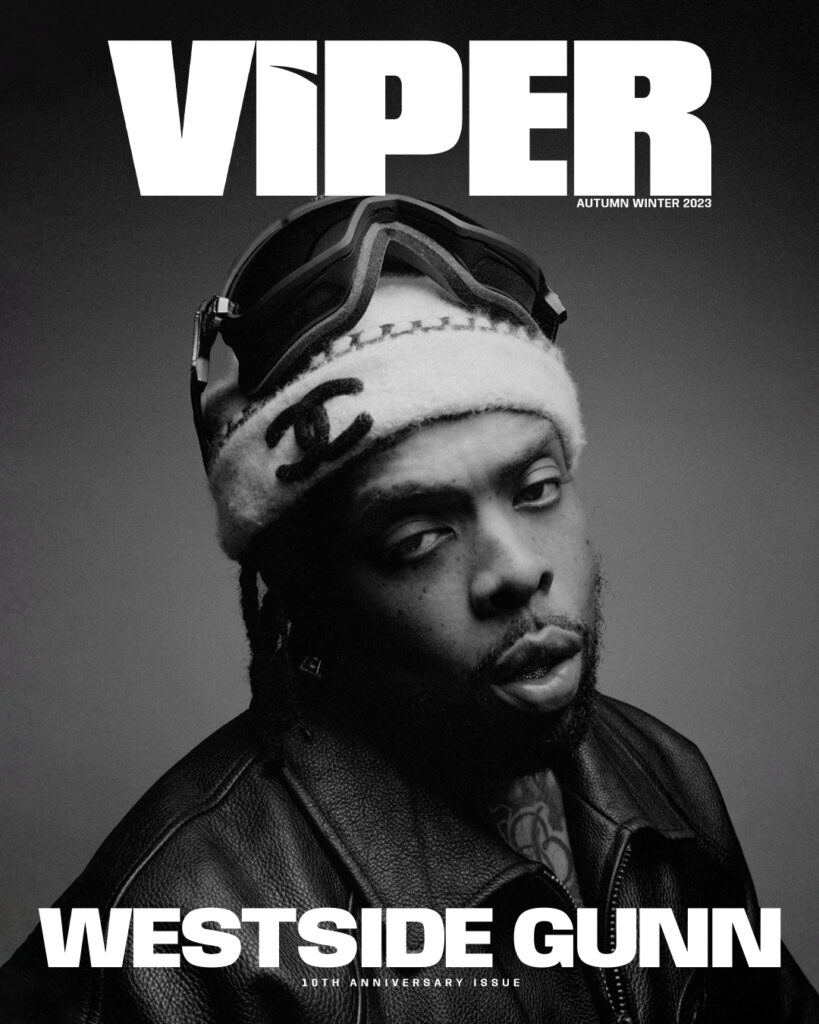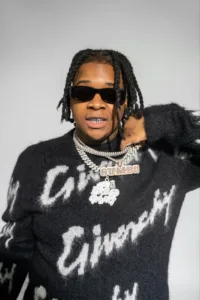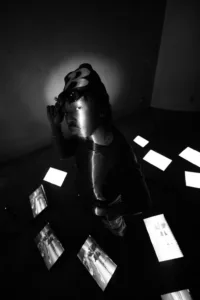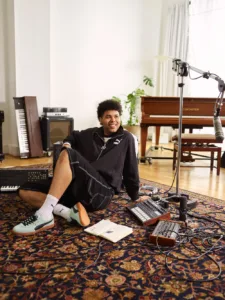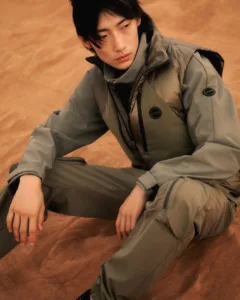ScHoolboy Q may not seem like the most obvious choice for the cover story of Viper’s Sex Issue, but he’s the perfect subject. With some of the most sexually charged lyrics heard in rap over the last few years, he takes more influence from Too Short than the average California rapper. And he’s the coolest Quincey since Mr. Jones.
Having released music as ScHoolboy Q since 2008 when he dropped ‘ScHoolboy Turned Hustla’, he followed up the mixtape with 2009’s ‘Gangsta & Soul’. His first album, the independent release on Top Dawg Entertainment, ‘Setbacks’, came in 2011 and its follow up, ‘Habits & Contradictions’ in 2012. His latest album, ‘Oxymoron’ acts as a snapshot of the pitfalls of our times, as he addresses the problems with potentially the greatest drug epidemic affecting our generation, prescription pills.
Born in Wiesbaden, southwest Germany, to a mother and father in the army, Quincey Hanley was unique from the day he entered the world. His surname was chosen at random by his mother following his parent’s decision to separate, and shortly after he moved to Texas with his mother before they settled in South Central Los Angeles. We meet in Paris on his first day in the city. Tonight he’ll perform to a sold out crowd in a 19th Century theatre in the 11th arrondissement, but right now he’s talking sex with Viper.
“Q, how do you feel about being our cover star for the Sex Issue?” I ask. “That’s tight! The naked girls though, that’s crazy. I didn’t know nothing about that!” he says in response to the news of two semi-nude females on set. Sex is a popular topic in ScHoolboy Q’s lyrics, but not the dominant theme. “I mean, I’m not a homosexual so I like to have sex with pretty girls. Anytime I see a pretty girl I wanna have sex with her but I don’t get that wish all the time [Laughs] So I put it in my lyrics a lot.” But unlike many rappers, he seems to avoid objectifying women for the sake of it. In fact, he prefers to rap about pleasuring them, “Yeah, I love women, I love women. You gotta be nice to women.”
Figg get da money, sHooting’ dice, wHat tHey Hitting’ for?
Hookers out to sell tHe pussy, money trade for intercourse
Every corner – liquor store, laundromat, liquor store,
EBT accepted more.
CHurcHes ‘cross from motels, Lord knows pussy sells
CHurcHes ‘cross from motels, Lord knows pussy sells…
‘Oxymoron’ seems conceptual in places, with songs like ‘His & Her Fiend’ and ‘Grooveline Pt. 2’ touching on experiences related to drug addiction and prostitution. Q’s narrative is that of a pimp, as he sings, “Will you sell that pussy for me?” But he admits that the experiences are vicarious, having never been a pimp himself. “Nah, I grew up around them. Like Figueroa, the block I grew up on, is known for pimping and prostitution. You can walk up the street any time of the day and see girls walking up and down, like prostitutes and pimps. I never been a pimp like I say, I just tell a story, what I’ve seen. And if you listen to it, you can tell it’s me just painting a picture of where I grew up. It’s not just to degrade women, it’s picture painting.” He agrees that the references are more reportage than glorification, saying, “I’m not encouraging nothing I do but I definitely don’t glorify nothing I do.”
Hometown storytelling has always dominated his music, as is evident on ‘Setbacks’. Over the course of three verses, ‘Cycle’ details the life of a child gravitating towards gang culture, leading up to his eventual demise. But the most heartbreaking tales are those Q’s experienced first hand. On ‘Blessed’ he describes the moment a friend called to say his child has passed away. The tenderness Q shows towards his own child, sat on his lap, in that moment is enough to make you shed a tear. I did the first time I heard it. Not since Scarface on ‘This Can’t Be Life’ can I recall a rapper admitting he cried while reflecting on the loss of a child that wasn’t his own.
Another personal experience Q reflects on in his music is the gang culture of LA and his own role as a Hoover Crip. For many ignorant to the relations between Bloods and Crips, he’s added a new level of understanding. When I point out that many outside of the US think Bloods and Crips will kill each other on sight, he responds, “Yeah, but it’s not even how people really think it is. Bloods and Crips don’t get along, but Crips kill more Crips than Bloods. Crips beef with more Crips. My hood beef with all Crips, there’s not many Bloods around us where I’m at – it’s mainly Crips there and we get into it with Crips.”
He describes the way of life for those caught up in gang culture, “If you a stand up dude you’ll be alright. Mistakes happen, people get killed, people don’t get killed, people go to jail for life, some people don’t. Some people do a lot of time, come out, never see ‘em again, they on a whole new page. Some people go to jail back and forth, back and forth, and then you got some people like me.” In a hotel room in Paris, a topless model waits in the background before being motioned to lay alongside Q, he’s come a long way from Figueroa Street. Embarking on his first world tour at the age of 27, he’s got a lot to be proud of. “I’m the only one from my hood to do this, to be successful. The only one. The first one. Like how Snoop is the first Crip to come up from his hood, then there were others that came, you know what I mean? I’m the first so it’s cool.”
It was widely reported that ‘Oxymoron’ was a tale about Bloods and Crips. But Q explains how it evolved into a personal statement about his life. “When I first started making the album, that’s what it was about. But I ended up switching it and it was more so about me as a person and about how everything I was doing wrong, was trying to justify good for my daughter. I was selling dope or robbing somebody or whatever, I was doing it to survive and help my daughter out. You know what I’m saying, it was a good deed.”
Had a little daugHter
Glad it ain’t a boy
Knew sHe’d bring me Joy
So I named Her Joy
Kiss Her on tHe Head
THen I kiss Her lips
THen I kiss Her cheek
Lay Her down to sleep
– ‘I’m Good’
His four year old daughter, Joy, is referenced on countless songs in his back catalogue. And when she isn’t mentioned, she appears on the recording or in the video. A portrait of her wearing a balaclava was the cover art for ‘Oxymoron’, his debut album on a major label. She also opens the album, saying, “Hello” in an adorable voice, before announcing “Fuck rap, my daddy a gangsta,”
Being a rapper and a responsible father must be difficult at the best of times, but Q seems to manage it. He knows his subject matter isn’t child-friendly but believes it depends on the individual listening. “I don’t want kids to listen to my music. If you under 15 or 16, I don’t want you to listen to my music unless your parent is cool like me. My daughter can listen to my music ’cause I’m her parent and I know how I’m raising her.” Admitting that he’s very honest with her, he says, “It’s different with me. But on the whole, I wouldn’t want kids to listen to me.”
The bond between the two is evident, not to mention the obvious pride Q has in his daughter. In response to a question about Nas’ song ‘Daughters’ and the difficulties men have in raising girls, he says, “I mean that’s his opinion, I’m looking at it in a different way. Why my daughter can’t be like my homie? I mean I’m not about to be one of those fathers that’s like sheltering my daughter. If you wanna go out, go out. If you got a boyfriend and your shit is together, hey you got a boyfriend and your shit is together. At the end of the day, I met my daughter’s mother in high school, we had a kid together. You never know what can come out of that so I’m not gonna shelter my daughter from anything. She wanna talk about whatever, whether it’s sex whatever, I’m with it.”
I ask if he’d be concerned if she dated a rapper and he says, “Of course, but if that’s what you wanna do, hey,” then observes that not all rappers cheat. Rather than finding the experience of raising a daughter off-putting, he says he wants more daughters, “I only wanna have girls, no boys. I wanna have at least five kids, five or three kids and I want them all to be girls.” It’s refreshing to see a rap artist expressing love for his children, knowing that it does absolutely nothing to diminish his masculinity. If anything, it accentuates it.
Along with Joy, his Hoover roots keep Q grounded, even when working with local legends that he grew up listening to. ‘Oxymoron’ featured a couple of G-Funk era favourites, but he admits to wanting one more; the D.O.G.G. “I wanted Snoop, hopefully that can happen. But I had Kurupt on there, Suga Free, I’m glad I had those two on the project. I wanna work with Snoop Dogg still, I wish he’d been on the album. Him and DāM-FЦПK.”
Conversation turns to growing up in LA during the riots, and whether he’d witnessed the destruction. “Yeah, kinda. I witnessed it but only briefly, I only remember small bits because I was so young. But I remember little parts of just being outside and seeing the corner on fire. Seeing people running up the street. That’s all I remember ’cause they kept me in the house but it was going on so long that you had no choice but to see it eventually. But the mayhem, I don’t know, I just remember little pieces.”
His view on the cause of the riots, the LAPD’s attack on Rodney King, is interesting, especially the way he touches on people’s indifference to situations that affect us today. “It was straight race, if you wasn’t black, it was like… I mean I wouldn’t ever want nothing like that to happen to a race right now. If you not black, beat ’em up type shit, that’s stupid. It was stupid then, the riot. There’d been so many things that had happened besides Rodney King. I’m talking about why people didn’t riot when 9/11 happened? Why people didn’t riot when the plane went missing? Why the people in Nigeria that had they kids kidnapped, that I just been watching on the news, why we not rioting about that? Why we rioting over a regular average Joe? ‘Cause he got a gang of money out of being beat up anyway. Dude that didn’t even fight for himself, a drug addict.”
The cause of the tension must have had an effect on the community, causing racial tensions between those affected and those that weren’t. I ask if the tensions continued throughout his childhood, “I don’t know, I was so young but from what I think, it made it better. People were just like, I think that was the last straw, at least for LA. But there’s always gonna be racial tensions somewhere, it is what it is. There’s always something.”
This is an extract from the Summer 14 Issue of Viper Magazine. Read more from the magazine here. Buy physical and digital copies here.
@ScHoolBoyQ
Soundcloud.com/TopDawgENT
Words by Lily Mercer.
Photography by Flavien Prioreau.
